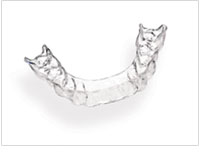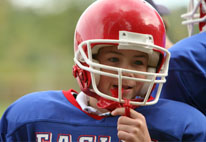Additional Procedures
 Bruxism, commonly know as tooth grinding, is the clenching together of the upper and lower jaw, accompanied by the grinding of the teeth. This behavior removes portions of healthy enamel from the chewing surfaces of your teeth and may cause facial pain. Many people unintentionally clench or grind too hard at inappropriate times, such as during sleep.
Bruxism, commonly know as tooth grinding, is the clenching together of the upper and lower jaw, accompanied by the grinding of the teeth. This behavior removes portions of healthy enamel from the chewing surfaces of your teeth and may cause facial pain. Many people unintentionally clench or grind too hard at inappropriate times, such as during sleep.
During sleep, the biting force can be up to six times greater than the pressure during waking hours. Bruxing is like clenching your fists and holding them tightly against each other for many hours . This behavior would cause you to end up with sore hands, arms and shoulders. The same thing happens to your jaw muscles.
Bruxism is a force that is far more destructive to teeth than caries. Since the enamel is worn down so much, the inside of the tooth called the dentin is exposed causing tooth sensitivity.
Symptoms of grinding or clenching:
- Pain or discomfort around the ears when yawning or chewing
- Tenderness of the jaw muscles
- Clicking, locking or popping of the jaw
- Jaw muscle contraction, spasms or cramping
- Loud clenching or teeth grinding
- Headaches and neck aches
- Ringing in the ears
- Tooth indentations on the tongue
- Fractures of teeth and fillings
- Teeth sensitive to cold, pressure and other stimuli
Complications:
- Damage to teeth
- May awaken sleep partner
- Worsening of TMJ dysfunction and dental disorders
- Limitation or difficulty in jaw movement
- The tips of the teeth wear flat
- Tooth sensitivity and mobility
Causes:
- Emotional stress
- Teeth that are not aligned properly or malocclusion
- Jaw, head or neck injury
- Missing teeth
Nightguard Treatment:
A nightguard, which takes the punishment your teeth would during bruxism, minimizes the damage to your teeth. A nightguard is a thin transparent horseshoe-shaped retainer-like appliance made of hard or soft acrylic. This splint is worn between the teeth not allowing them to interlock. It absorbs the force of clenching and grinding and reduces joint irritation and inflammation.
It takes two simple appointments. Initially, accurate impressions of your teeth are made. A bite record is also taken. At the second appointment, the nightguard will be fitted and adjusted. It can protect you from the symptoms of teeth grinding if worn regularly. It can even lead to a better night’s sleep for you and your partner!
In addition, learning to control bad habits, such as chewing on ice, fingernails or pens will help control your symp toms. Chewing gum increases the wear and tear on the joint, giving little opportunity for your jaw to recover between meals. If you chew habitually on one side of your mouth, you concentrate all the pressure on one side. You need to learn to chew evenly to distribute the forces on both sides of your mouth. A nightguard will help your chewing muscles learn this new behavior. Relaxation or stress management techniques are also important to learn.
Sport Mouth Guards
 A mouth guard is an important protective device used for various kinds of physical activities and sports. Hundreds of thousands of injuries occur every year involving the face and mouth that could be avoided or minimized if a mouth guard had been worn. Sport Mouth guards provide valuable protection for the jaw, face, tongue, lips, and of course, the teeth. A traumatic blow to the face can not only tear soft tissue or knock out teeth, but also may force the lower jaw into the upper jaw. A mouth guard can help keep your teeth from tearing the tissues of your mouth during a traumatic injury. Mouth guards can protect you when you’re wearing bridges or braces.
A mouth guard is an important protective device used for various kinds of physical activities and sports. Hundreds of thousands of injuries occur every year involving the face and mouth that could be avoided or minimized if a mouth guard had been worn. Sport Mouth guards provide valuable protection for the jaw, face, tongue, lips, and of course, the teeth. A traumatic blow to the face can not only tear soft tissue or knock out teeth, but also may force the lower jaw into the upper jaw. A mouth guard can help keep your teeth from tearing the tissues of your mouth during a traumatic injury. Mouth guards can protect you when you’re wearing bridges or braces.
Sport Mouth guards are generally small plastic appliances that fit safely around your teeth. Many mouth guards are initially soft and pliable, allowing them to mold to yo ur teeth when first inserted. Custom-fitted mouth guards are usually made by your dentist. Custom mouth guards protect your mouth and other facial structures much better than pre-molded guards found in sporting goods stores.
Sport Mouth guards can help prevent a whole host of traumatic injuries to the neck and jaw, as well as more serious problems such as cerebral hemorrhages and concussions. Your mouth guard needs to be cleaned and allowed to air dry after each use. You also can soak your mouth guard in an antiseptic mouthwash to help remove any germs.